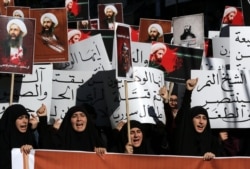Saturday's attacks on Saudi oil installations in the country's predominantly Shi'ite Eastern Province could heat up long-standing tensions with the Saudi Kingdom's Sunni majority. The complex political stew includes allegations that Yemen's Shi'ite rebels, who claimed they launched the attack, had help from inside Saudi Arabia.
However, Saudi-coalition spokesman Col. Turki al-Maliki denies the Shi'ite Houthis were behind the attacks.
He says that an investigation of the attacks is under way, but initial indications are that the Houthis did not carry out the strikes, but are merely pawns of the "terrorist" Iranian Revolutionary Guard.
"Iranians have been trying to drum up trouble in the mainly Shi'ite parts of Saudi Arabia for some time," Dr. Paul Sullivan of the U.S. National Defense University told VOA.
"Iranian mullahs will always try to weaken Saudi Arabia in whatever way they can," he said, adding that "there will be a crackdown, and a big one," if Iran gains support in Shi'ite parts of Saudi Arabia.
Saudi authorities have executed some prominent Shi'ites in the eastern region since 2016, including Sheikh Nimr Baqr al-Nimr, raising tensions both inside the kingdom and with Iran. Iranian demonstrators torched the Saudi consulate in the city of Mashhad after the execution.
It is a conflict with both regional and international dimensions, according to former Iranian President Abolhassan Bani-Sadr, who said many forces are pushing to escalate the conflict between Iran and Saudi Arabia. The situation in the region is extremely dangerous, he added, and the international community needs to change its strategy to avoid a conflagration.
President Donald Trump should "try to stop the conflict in Yemen," Bani-Sadr said, adding that "all the lives that are being lost there should have some value. Oil is not the only thing to consider in the world." He also said the U.S. should go back to supporting a "multipolar Middle East," rather than relying on a "Saudi-Emirati-Israeli" alliance, which he said Trump has done.
"That sort of alliance," he said, "will not work, and will just aggravate existing conflicts."
Bani-Sadr added that resolving the conflict in Yemen and respecting the rights of Shi'ites in other parts of the Arab world, including Saudi Arabia, could reduce regional tensions.
Hilal Khashan, who teaches political science at the American University of Beirut, agreed.
"Shi'ites in Saudi Arabia's Eastern Province would never have turned to Iran if the Saudi [government] had accommodated them," he said. "The Shi'ites wanted to be integrated into Saudi politics, but their pleas did not have open ears in [the Saudi capital of] Riyadh."
Washington-based Gulf analyst Theodore Karasik, however, thinks that many, if not most, Saudi Shi'ites are loyal to the government and that Riyadh has responded to their various requests.
He said there have been improvements since King Salman took the throne, and that investment in the Eastern Province to improve living conditions shows the Saudi government recognizes the issue. Iran's attacks on Saudi Arabia may help to "awaken old feelings," he noted, "but Saudization is starting to bury regional or religious divisions."






